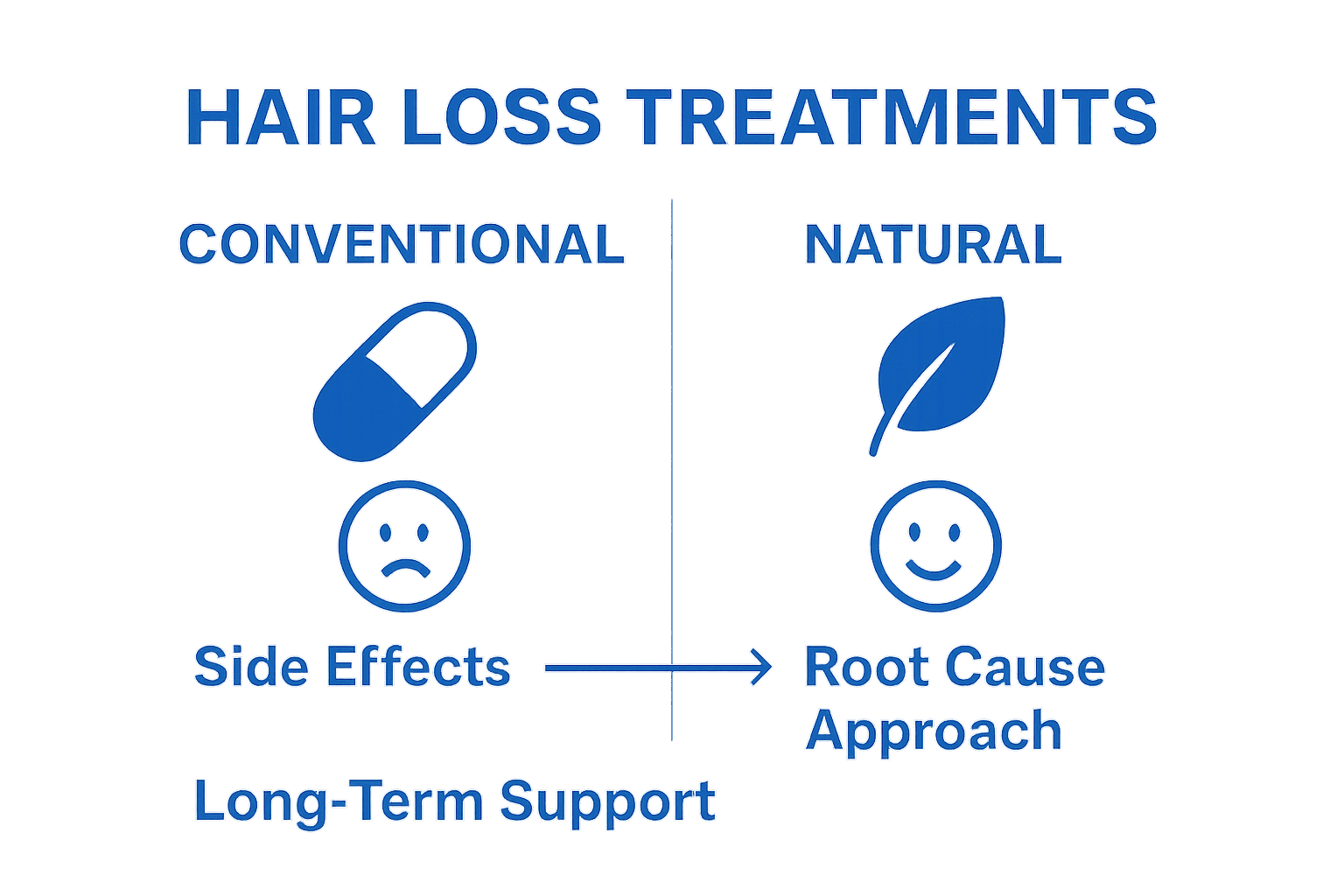Blog
Learning Materials
Understanding Herbs for Hair Growth: Nature's Solutions
Updated: September 1, 2025

Natural herbs have been at the center of hair care discussions for ages and today they matter more than ever. Research shows that rosemary extract can rival the effectiveness of common pharmaceutical hair loss treatments, something most people would never expect from a simple kitchen spice. Oddly enough, these botanical powerhouses do more than grow hair—they often solve scalp issues regular products ignore.
Table of Contents
- The Role of Herbs In Hair Health And Growth
- Why Natural Remedies Matter For Hair Loss
- How Specific Herbs Promote Hair Growth
- Key Nutrients In Herbs And Their Function For Hair
- Real-World Applications Of Herbs For Thicker Hair
Quick Summary
| Takeaway | Explanation |
|---|---|
| Herbs enhance hair growth effectively | Natural herbs stimulate blood circulation, reduce inflammation, and deliver nutrients to promote robust hair growth. |
| Rosemary and saw palmetto are key herbs | These herbs are known for blocking harmful enzymes and providing essential nutrients that support follicle health. |
| Natural remedies have fewer side effects | Herbal treatments work harmoniously with the body, avoiding the drawbacks of synthetic medications. |
| Targeted herbal applications yield results | Using topical treatments like scalp serums or hair masks can directly nourish hair follicles for better health. |
| Micronutrients in herbs support hair health | Essential nutrients found in herbal compounds aid in protecting hair and promoting growth at the cellular level. |
The Role of Herbs in Hair Health and Growth
Herbs for hair growth represent a powerful natural approach to addressing hair health challenges, offering holistic solutions that work with your body's inherent biological processes. Understanding how these botanical ingredients interact with hair follicles can unlock potential strategies for improving hair density, strength, and overall scalp wellness.
Understanding Herbal Mechanisms of Hair Growth
Natural herbs possess unique compounds that interact directly with hair follicle biology. These botanical extracts can stimulate blood circulation, reduce inflammation, and provide essential nutrients that support robust hair growth. Learn more about personalized hair growth strategies that integrate herbal solutions tailored to individual needs.
According to research published in PubMed, certain herbal extracts like rosemary demonstrate significant potential in promoting hair regrowth. These botanical compounds work through multiple pathways:
- Inhibiting 5-alpha reductase enzyme activity
- Improving local blood circulation
- Reducing scalp inflammation
- Providing essential micronutrients for follicle health
Biochemical Interactions of Herbal Compounds
The effectiveness of herbs in hair growth stems from their complex biochemical profiles. Phytochemicals within these natural extracts interact with human cellular mechanisms, triggering regenerative processes that support hair follicle function. Some herbs contain antioxidants that protect hair roots from oxidative stress, while others provide direct nutritional support to strengthen hair structure from within.
By understanding these intricate biological interactions, individuals can strategically incorporate herbal remedies into their hair care routines, addressing root causes of hair thinning and promoting sustainable hair growth through natural, holistic approaches.
Why Natural Remedies Matter for Hair Loss
Natural remedies for hair loss represent a holistic and increasingly popular approach to addressing hair health challenges, offering individuals safer alternatives to synthetic treatments. By focusing on root causes and supporting the body's inherent healing mechanisms, these botanical solutions provide comprehensive strategies for managing hair loss with minimal side effects.

The Limitations of Conventional Hair Loss Treatments
Traditional pharmaceutical interventions often come with significant drawbacks. Synthetic medications can cause hormonal disruptions, sexual dysfunction, and potential long-term health complications. Natural remedies, in contrast, work harmoniously with the body's biological systems, providing gentler yet potentially effective alternatives. Check out our comprehensive guide to natural hair restoration to understand these holistic approaches better.
According to comprehensive research published in international medical journals, herbal interventions demonstrate promising results in addressing hair loss through multiple mechanisms:
- Reducing inflammatory responses in hair follicles
- Balancing hormonal interactions that contribute to hair thinning
- Providing essential micronutrients for follicular health
- Enhancing local blood circulation to support hair growth
Systemic Benefits of Natural Hair Loss Interventions
Beyond addressing hair loss directly, natural remedies offer broader health advantages. These botanical solutions support overall wellness by targeting underlying nutritional deficiencies, reducing oxidative stress, and promoting balanced hormonal function. By treating hair loss as a systemic issue rather than a localized problem, natural approaches provide more comprehensive and sustainable solutions.
Below is a comparison table highlighting the differences between traditional pharmaceutical hair loss treatments and natural herbal remedies, helping readers understand their respective benefits and limitations.
| Approach | Advantages | Drawbacks |
|---|---|---|
| Pharmaceutical Treatments | May be effective for many users; predictable results | Can cause hormonal disruptions and side effects; long-term health risks |
| Natural Herbal Remedies | Work harmoniously with body; fewer side effects; holistic benefits | May require longer time for visible results; individual responses can vary |
Understanding and embracing natural remedies empowers individuals to take a proactive, holistic approach to hair health, focusing on prevention and long-term restoration through scientifically supported botanical interventions.
How Specific Herbs Promote Hair Growth
Herbal remedies offer targeted approaches to hair growth by leveraging complex biochemical interactions that support follicular health and stimulate natural regeneration processes. Different herbs contribute unique mechanisms that address various underlying factors contributing to hair loss and thinning.
Biochemical Mechanisms of Hair Growth Herbs
Certain herbs demonstrate remarkable potential in promoting hair growth through sophisticated biological pathways. Rosemary, for instance, contains compounds that inhibit 5-alpha reductase, an enzyme linked to hormonal hair loss. Explore advanced hair growth techniques that integrate these herbal strategies effectively.
According to research published in medical journals, several herbs demonstrate significant hair growth potential through distinct mechanisms:
- Blocking testosterone conversion into dihydrotestosterone
- Increasing local blood circulation in scalp regions
- Providing antioxidant protection for hair follicles
- Stimulating cellular regeneration in hair roots
Specific Herbal Interventions for Hair Restoration
Unique herbal ingredients like saw palmetto, green tea extract, and peppermint oil offer targeted interventions for different hair loss scenarios. Green tea polyphenols can protect hair follicles from oxidative stress, while peppermint oil potentially enhances dermal thickness and follicular density by improving microcirculation.
By understanding the nuanced interactions between botanical compounds and human biology, individuals can develop more personalized and effective strategies for addressing hair growth challenges through natural, scientifically supported herbal interventions.
This table summarizes key herbs mentioned in the article, their primary mechanisms, and unique benefits for hair growth based on current research insights.
| Herb | Main Mechanism | Unique Benefit |
|---|---|---|
| Rosemary | Inhibits 5-alpha reductase, increases circulation | Rivals pharmaceutical drugs for regrowth |
| Saw Palmetto | Blocks testosterone conversion, hormonal balance | Reduces androgenic hair loss |
| Green Tea | Antioxidant, reduces oxidative stress | Protects hair follicles |
| Peppermint Oil | Improves scalp microcirculation | Increases dermal thickness, follicle density |
| Ginseng | Stimulates cellular regeneration | Enhances new hair development |
| Nettle Root | Supplies essential micronutrients | Supports overall scalp wellness |
Key Nutrients in Herbs and Their Function for Hair
Herbal nutrients play a critical role in supporting hair health through complex biochemical mechanisms that address multiple aspects of follicular function and cellular regeneration. Understanding the specific nutrients within botanical extracts reveals how these natural compounds contribute to robust hair growth and overall scalp wellness.
Essential Micronutrients in Herbal Compounds
Phytonutrients represent a powerful class of compounds that deliver targeted nutritional support for hair follicles. These specialized molecules contain antioxidants, minerals, and bioactive substances that interact directly with cellular processes responsible for hair growth. Discover personalized nutrition strategies for hair health to complement herbal interventions.
According to comprehensive research published in botanical medicine journals, herbal nutrients demonstrate remarkable capabilities through several key mechanisms:
- Neutralizing free radical damage in hair follicle cells
- Supporting keratin protein synthesis
- Regulating hormonal interactions affecting hair growth
- Enhancing cellular metabolic processes
Biochemical Pathways of Nutrient Interaction
Certain herbs like ginseng, saw palmetto, and nettle root contain specific nutrients that interact with hair growth pathways. Zinc and selenium found in these botanical extracts help regulate enzyme production, while flavonoids and polyphenols provide anti-inflammatory protection. Iron and biotin support keratin production, ultimately contributing to stronger, more resilient hair structures.
By comprehensively understanding the intricate nutrient profiles of herbal compounds, individuals can develop more targeted and effective strategies for supporting optimal hair growth through scientifically validated botanical interventions.
Real-World Applications of Herbs for Thicker Hair
Transforming herbal knowledge into practical hair care strategies requires understanding how botanical compounds can be effectively integrated into daily routines. Real-world applications of herbs offer diverse approaches to addressing hair thinning and promoting robust follicular health through targeted, natural interventions.
Topical Herbal Treatment Strategies
Natural herbal extracts can be incorporated into hair care regimens through multiple application methods. Scalp treatments, hair masks, and direct oil applications provide pathways for delivering concentrated botanical nutrients directly to hair follicles. Explore advanced techniques for natural hair thickening to maximize herbal intervention effectiveness.
According to comprehensive research in botanical medicine, practical herbal applications demonstrate significant potential through several key approaches:
- Creating concentrated herbal scalp serums
- Developing targeted hair mask formulations
- Implementing scalp massage techniques with herbal oils
- Designing personalized herbal supplement protocols
Clinical Evidence and Practical Implementation
Certain herbs like ginseng, saw palmetto, and nettle root have shown measurable results in clinical settings. Peppermint oil, for instance, has demonstrated increased dermal thickness and follicle density in research models. Practitioners recommend integrating these herbs through strategic topical applications and internal supplementation, tailoring approaches to individual hair loss patterns and underlying physiological conditions.
By bridging traditional botanical knowledge with modern scientific understanding, individuals can develop nuanced, personalized strategies for leveraging herbal interventions to support thicker, healthier hair growth.

Transform Your Hair Health With Nature and Smart Technology
Are you struggling to see results from natural remedies alone? The article highlighted how understanding herbal mechanisms can powerfully impact hair growth, but sometimes it is hard to know which approach is right for your unique scalp and hair type. You may feel frustrated by trial and error, uncertain if rosemary oil, green tea, or other herbal solutions suit your individual needs. What works for others may not deliver the growth or thickness you seek, especially if you do not address the specific causes behind your hair changes.

At MyHair.ai, you can say goodbye to guesswork and unlock a new level of personalized care. Our AI technology analyzes your hair scans, tracks your progress, and delivers detailed insights into your hair’s condition. We recommend the herbal products and techniques that match your biology, based on proven science and clinical research discussed in the article. Get started with your tailored hair growth journey today and experience real progress with nature’s ingredients smartly matched to your needs. Visit MyHair.ai now to see how your hair can thrive when advanced technology meets herbal expertise. If you want to expand your understanding of personalized hair growth strategies, explore our proven advanced hair growth techniques and take control of your journey. Don’t wait, discover a solution tailored just for you.
Frequently Asked Questions
What herbs can promote hair growth?
Several herbs that can promote hair growth include rosemary, saw palmetto, ginseng, and green tea extract. These herbs work through different mechanisms, such as improving blood circulation, blocking harmful enzymes, and providing essential nutrients to hair follicles.
How do herbal remedies work for hair loss?
Herbal remedies for hair loss function by addressing underlying issues like inflammation, hormonal imbalances, and nutritional deficiencies. They often contain compounds that enhance blood circulation and support the health of hair follicles, leading to improved hair growth.
Can I use herbs topically for hair growth?
Yes, many herbs can be used topically in the form of scalp serums, hair masks, or oils. This direct application allows the herbal nutrients to penetrate the scalp and hair follicles effectively, thus promoting hair health.
Are natural remedies safer than conventional hair loss treatments?
Natural remedies are often considered safer than synthetic treatments because they work with the body's biological systems, minimize side effects, and cover broader health benefits. However, individual responses may vary, so it's important to consult with a healthcare provider before starting any new treatment.